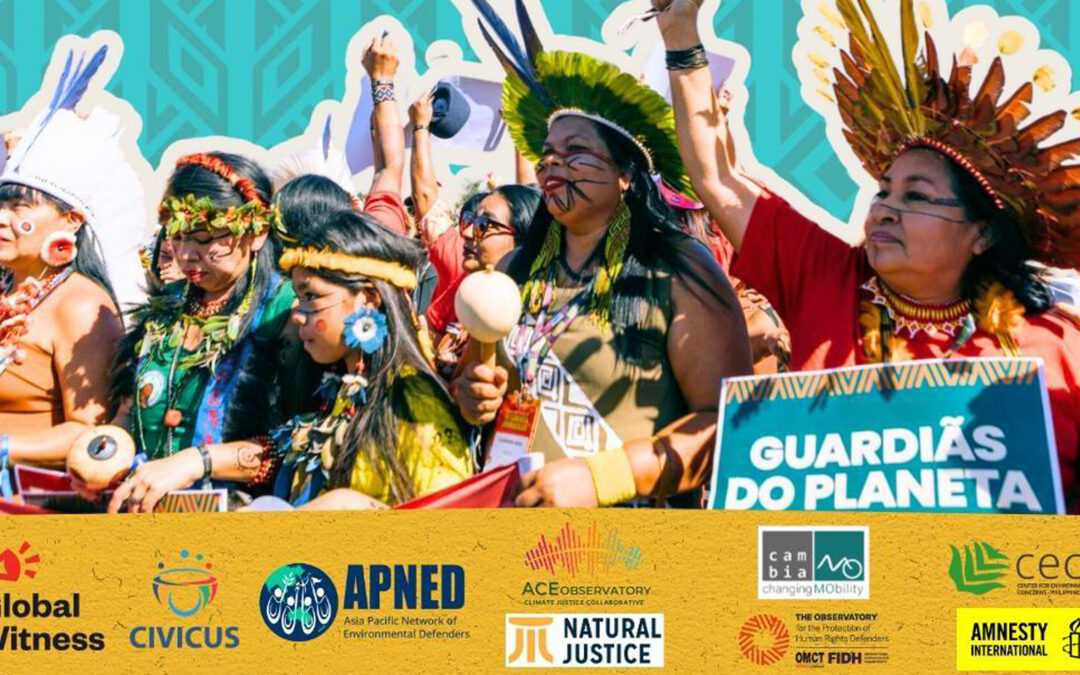cambiaMO, together with the Asia Pacific Network of Environment Defenders (APNED), Center for Environmental Concerns – Philippines, CIVICUS, Global Witness, International Federation for Human Rights (FIDH), Natural Justice, Amnesty International, the Brazilian Committee of Human Rights Defenders, and the ACE Observatory, hosted a side event during COP30 titled “Environmental Defenders and Communities: A Cross-cutting Priority in Climate Negotiations and Decisions.”
The session was moderated by Denise Dora, Special Rapporteur for Just Transition and Human Rights. The panel brought together representatives from Just Transition and Human Rights; the Brazilian Ministry of Human Rights and Citizenship; the Office of the High Commissioner for Human Rights (OHCHR); FIDH; Natural Justice; a Maya Mam and Maya Quiché woman from Guatemala; an environmental defender from Kenya; the Center for Environmental Concerns – Philippines; the Cariongo Quilombola Community from Brazil; an environmental and human rights lawyer from the Democratic Republic of Congo (DRC); and the Brazilian Committee of Human Rights Defenders.
UN representatives offered an overview of the dire realities facing environmental defenders. With escalating climate disasters and growing competition for natural resources, defenders stand on the front lines of increasingly hostile and insecure environments. They safeguard their cultural and natural heritage in the face of exploitation, intimidation, violence, loss of liberty, and even death.
But it was the environmental defenders themselves who delivered the most poignant testimonies. Speakers from Guatemala, Brazil, Kenya, the DRC, and the Philippines shared the deep connections their communities hold with forests, rivers, and agricultural traditions, and how they understand their responsibility to protect the ecological diversity that benefits all people.
One defender asked the audience whether they enjoyed coffee, sugar, and chocolate—three products heavily consumed in the Global North—and described the intense labor required to produce them cheaply, as well as the toll this takes on farmers’ bodies. Many panelists have faced death threats, arrest, and criminalization for resisting extractive projects, opposing forced evictions, and defending access and rights to their lands.
Across the panel, there was a unified call for COP30 to adopt concrete measures to strengthen protection for environmental defenders; to recognize the ancestral knowledge of frontline communities as legitimate science; to ensure their meaningful participation in climate negotiations; and to hold individuals, companies, and governments accountable for the harm they cause to people and the planet.
Closing remarks were delivered by Alane Luzia da Silva from the Brazilian Committee of Human Rights Defenders, who highlighted a new national policy in Brazil aimed at expanding protection, creating political space for communities in decision-making processes, and guaranteeing institutional accountability.
All panelists agreed on a central message: there is no climate justice without safeguarding the rights and safety of those who defend the environment. They emphasized the need for global solidarity with the communities protecting their territories—not only for their own survival, but for the wellbeing of all humanity.
A special thank you to Global Witness, the local organizer, for ensuring linguistic justice and providing asynchronous translation between Portuguese and English.







